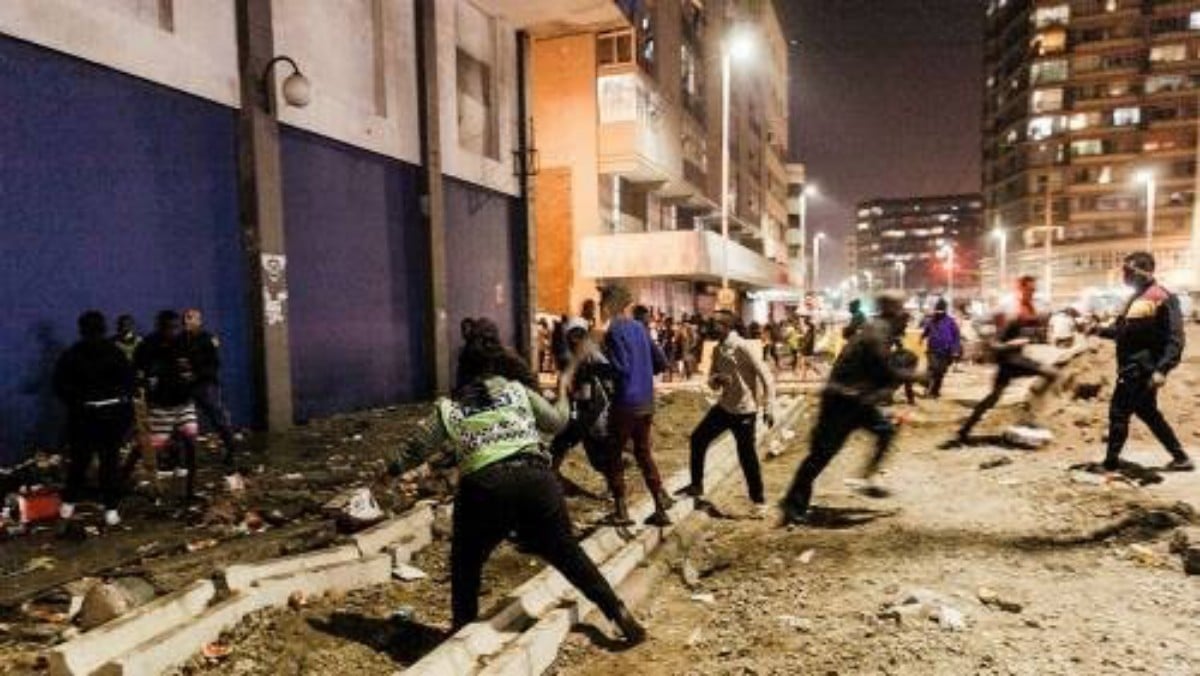Foreign
Unrest in South Africa Claims 270 Lives

South Africa has been engulfed by the worst unrest and mass violence in the past 13 days. This level of violence has been said to be the worst since the end of apartheid.
Reports say the unrest triggered by the imprisonment of former South African President Jacob Zuma has claimed 276 lives.
Following his refusal to appear before a graft panel, Zuma was sentenced to 15 months in prison for contempt of court.
While things have settled into an uneasy calm as the military patrol the worst-hit areas, the nation remains anxious and fearful.
The 79-year-old was convicted for defying court order to testify before an inquiry probing allegations of corruption against him when he held the fort as president.
The fierce showings, that began in KwaZulu-Natal, Zuma’s region, spread to Gauteng Province with numerous shops plundered, a few harmed and vehicles vandalized.
An acting Minister in the President’s Office, Khumbudzo Ntshavheni, said investigation on the deaths resulting from the unrest showed that 276 persons have died so far, adding that 168 of the deaths were being investigated for murder.
The minister said: “Since the unrest, total of 234 deaths as related to the unrest were reported in KwaZulu-Natal to date. The SA Police Service (SAPS) are investigating 151 cases for murder and 83 inquest dockets have been opened and 15 arrests related to the cases of murder have been made,” she said.“A total of 42 deaths as related to the unrest were reported in Gauteng to date, and of these reported deaths, the SAPS are investigating 17 cases for murder, and 25 cases are still at an inquest stage and no arrests have been made as yet related to the cases of murder.”
Table of Contents
Unrest in South Africa Targeted at the Economy
President Cyril Ramaphosa has described the unrest as an insurrection targeting the country’s economy and infrastructure.
The insurrection, triggered by ex-President Jacob Zuma’s imprisonment for contempt of court on July 7, has already seen at least 270 deaths, the supply chain of an entire province destroyed, billions of dollars worth of damage inflicted on two of the country’s major cities, and hundreds of businesses and key parts of the country’s infrastructure burned to the ground.
What Triggered the Unrest in South Africa?
The unrest began on Friday, July 9, when a heavily armed and masked gang hijacked trucks near the Mooi River Toll Plaza and used them to block the road before torching 25 vehicles.
The toll gate is a key part of the country’s economy as it links the port of Durban, the largest in sub-Saharan Africa, to the country’s economic heartland of Gauteng.
Following this assault, different gatherings utilized consuming tires and logs to impede streets. In the days that followed, enormous quantities of individuals plundered retail outlets across KwaZulu-Natal and Gauteng, prior to turning on other businesses.
While a significant number of those elaborate plundered food and fundamental merchandise – an impression of the franticness and destitution that plagues South Africa – others, including some driving costly vehicles, took shopper products – TVs, speakers, and such – while the police remained by apparently incapable or reluctant to respond.

At a similar time as the mass plundering was occurring, an efficient and arranged mission of monetary harm designated the whole store network of KwaZulu-Natal alongside key interchanges framework, water offices and other essential pieces of the area’s economy.
Reports say Clinics, schools and drug stores were likewise targeted and, because of the agitation, the whole COVID-19 immunization drive in Durban, a city of around 4,000,000, was suspended in the midst of a staggering third wave.
Clashes between vigilantes and “looters” led to the death of a number of people.
Unrest in South Africa; Is there an ethnic Angle?
An independent writer Benjamin Fogel had reported that social media agitators have been on social media attempting to foment racial conflict.
He said KwaZulu-Natal has a history of racial violence between the province’s Black population and its large ethnically Indian community, including events such as the 1949 Durban riots, a bitter racial conflict between the city’s Black and Indian population that killed 142 people.
Is south Africa dangerous to visit?
An acting Minister in the President’s Office, Khumbudzo Ntshavheni said “stability” had returned to the two provinces rocked by unprecedented violence and that police were carrying out “mopping-up operations to ensure opportunistic and copycat activities do not find traction”.
However, reports from a local station suggest that Police stations across South Africa , especially those with arms storage facilities, have been placed on high alert. They said there has been intelligence that “instigators” may be planning to attack, with the intention of stealing guns, ammunition and other weapons.
So can we say it’s safe to travel to South Africa? Only time will tell.

